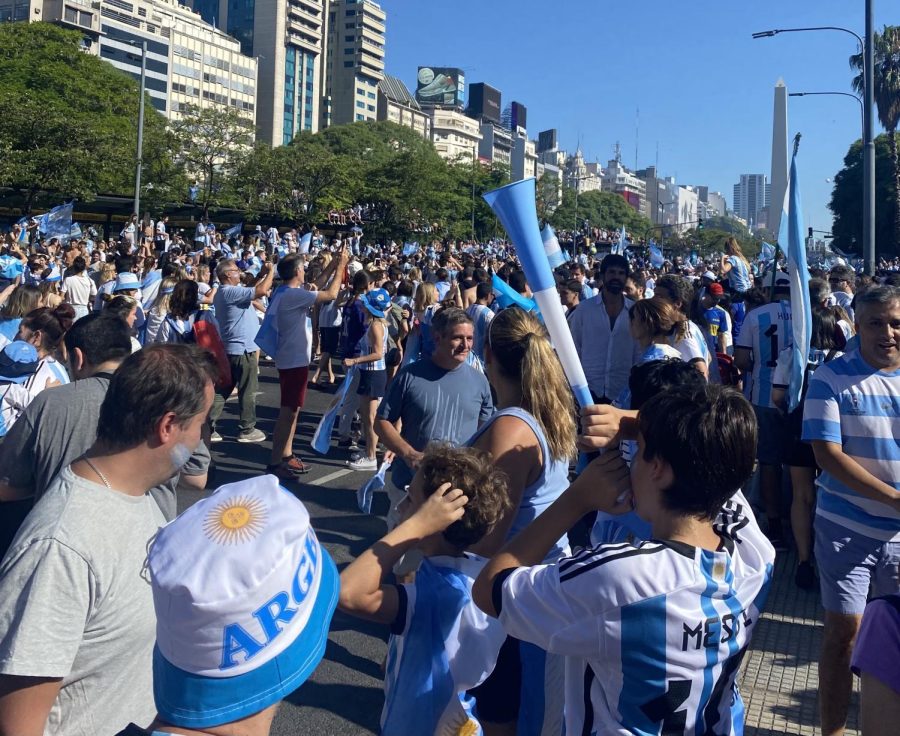When soccer is more than a sport: World Cup victory unites Argentina
Wearing their beloved light blue and white uniforms, millions swarmed the streets to celebrate the momentous victory.
January 11, 2023
Silence crept over the Argentinian capital of Buenos Aires as the nation held its breath, watching the final penalty kick of the 2022 FIFA World Cup. After a month of ups and downs for “La Selección” — Argentina’s national soccer team — families and friends had gathered around TV screens to watch what would become one of the most thrilling finals in the history of the championship.
At precisely the moment when Gonzalo Montiel stepped up to the spot and kicked the ball past the French goalkeeper, a celebration like nothing ever seen before began.
Wearing their beloved light blue and white uniforms, millions swarmed the streets to celebrate the momentous victory. Families spilled out of apartment buildings in masses, waving flags and blowing horns while blocking cars that attempted to pass by. All were on their way towards Obelisco de Buenos Aires, the national monument where two million fans united to celebrate the win.
Near the monument, a giant uniform hung from the Colón Theater located on the avenue, with the jersey titled “Champions of the World,” while fans looked up to see a brand new third star, marking the win. The Plaza de Mayo — a popular city square in the capital — became a sea of blue and white as fans dressed in uniforms and face paint converged.
The win comes at a difficult time for the country. Argentina is facing some of the world’s highest inflation — with rates surpassing 70% in September — and a divided political landscape makes progress difficult. In the past year, the country has suffered from declining wages and a reduction in purchasing power, jeopardizing citizens’ savings. For Argentine resident Martha Mendez, who witnessed her country’s last World Cup victory over 36 years ago, the team’s accomplishment brings a wave of much-needed joy.
“Soccer seems to be the only thing that unites us, which bridges all differences,” Mendez said. “For soccer, we all beat and think in tune.”
The win wasn’t just monumental for the citizens of the country, but also for La Seleccion’s captain Lionel Messi, a world-famous player whose success with the national team had been limited until last year’s Copa America victory over Brazil. Messi is considered one of the best soccer players of all time but is nearing the age of retirement, only adding to the already immense pressure.
Argentina last witnessed its team score a World Cup victory in 1986, when Diego Maradona led the national team to victory after scoring two famous goals against England in the quarterfinals. FIFA named Maradona and soccer icon Pélé, who died on Dec. 29, the best players of their generation in 2000. Maradona and Messi appear in the lyrics of the song “Muchachos” which fans and players adopted as Argentina’s unofficial anthem during the tournament.
“Muchachos, now we’ve got our hopes up again,” said a dressed-up Maradona from his perch on a friend’s shoulders near the obelisk after the game. A crowd formed behind him, repeating the lyrics of the song. “I want to win the third one, I want to be world champion!”
Within days of the victory, the Argentine government declared Dec. 20 a federal holiday to let residents see the players’ return home from the tournament. The team traveled around the city on an open-top bus, and millions came out to greet the team. Although safety concerns that arose from the sheer number of fans in the capital prevented the team’s players from traveling to the obelisk, they made a rallying appearance at the celebration site by helicopter instead.
For just a short period of time, the Argentinian people’s shared passion for soccer united the nation in celebration. It brought a rare joy that would transform ordinary streets into gathering places for a unique display of national pride.









